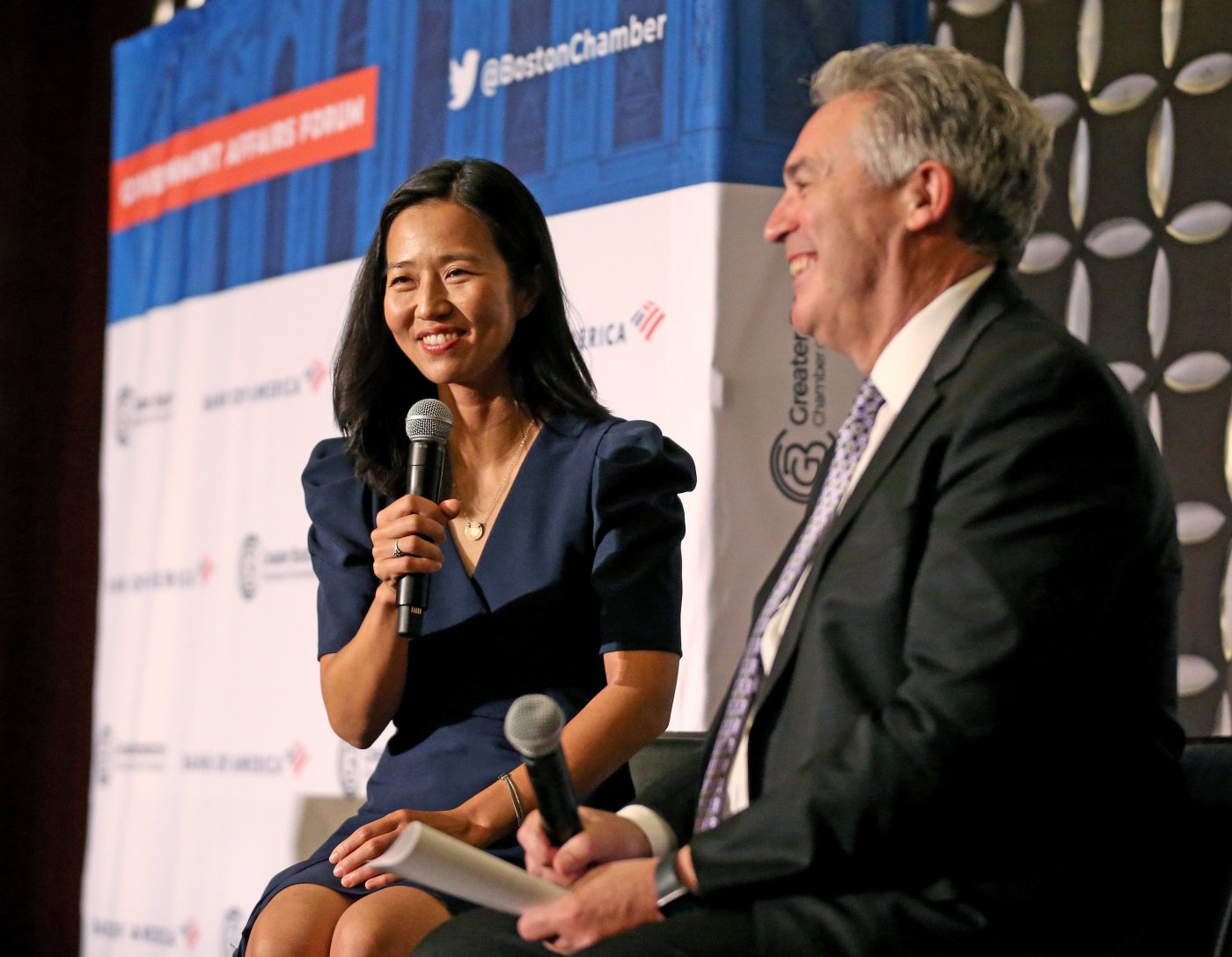
Boston Chamber chief urges City Council to rein in Mayor Wu’s spending amid economic uncertainty
The head of the Greater Boston Chamber of Commerce criticized the mayor’s decision to raise the city budget by 8% amid economic uncertainty while urging the City Council to practice “fiscal discipline” by making cuts to her spending proposal.
In a letter addressed to Councilors Brian Worrell and Enrique Pepén, chair and vice chair of a subcommittee overseeing the Council’s budget review process, Chamber CEO and President Jim Rooney urged all 13 councilors to keep budget growth to 3-4% for the next fiscal year that begins July 1.
That type of increase would be in line with inflation, Rooney wrote, and is more appropriate than the healthy budget growth Mayor Michelle Wu is proposing at a time when she is also seeking to raise commercial tax rates — a pending plan the Chamber “strongly opposes” — given “current revenue and economic uncertainty.”
“High interest rates and a burdensome regulatory process will slow commercial property growth this year, and federal pandemic assistance is no longer available to bolster the city’s finances,” Rooney wrote in the letter sent Wednesday. “The city should proceed cautiously as residents and businesses will bear the brunt of the resulting tax increases that may be necessary to match the proposed spending.
“I urge the (Council’s Ways and Means) committee to practice fiscal discipline as Boston navigates these challenges.”
In his written testimony, first reported by the Boston Globe, Rooney said the mayor’s proposed 8% spending increase of $344 million for fiscal year 2025 is higher than the two prior years, when spending increased by 6.8% and 5.9% in FY24 and FY23, respectively.
He urged the Council, which was granted the power to amend the mayor’s budget two years ago, to produce a plan with “modest spending growth” by identifying areas that can be cut while maintaining funding for core city services such as public schools and public safety.
Rooney also pointed to the state’s budget approach as being a potential model, in terms of it featuring modest growth of 3.6% while the Healey administration has implemented a hiring freeze “amid similar revenue uncertainty.”
The Chamber’s suggestions further include making a pitch for the mayor to offset a “dramatic increase” in residential taxes by dipping into the city’s nearly $1.2 billion budgetary reserve account and petitioning the state for a higher residential tax exemption, rather than raising commercial tax rates.
Rooney’s argument mirrors the findings of a report released last week by the Boston Municipal Research Bureau, which also advocated for responding to the city’s declining commercial tax base by cutting spending, utilizing budget savings, and petitioning the state for a new local tax to offset the city budget’s reliance on property taxes, which comprise more than 70% of annual revenue.
Related Articles
Boston city councilors wrestle over how to declare support for local Jews
MassGOP blasts Wu’s holiday party spending: ‘Blatant disregard for public finance rules’
Gov. Maura Healey, Mayor Michelle Wu plan to use public dollars to pay for Italy trip
Boston Mayor Michelle Wu used campaign funds for ‘electeds of color’ holiday party, records show
Boston Mayor Wu says Emerson College student protesters wanted to be arrested
Roughly a third of the city’s annual budgetary revenue comes from commercial property taxes despite those owners collectively holding much less property than homeowners due to state law that allows municipalities to shift up to 175% of the residential tax rate onto commercial owners.
Mayor Wu is seeking to increase that shift beyond the state limit up to 200% beginning next year, a shift that would gradually decrease until returning to the standard rate by fiscal year 2029.
She needs approval from the City Council, where two members, Ed Flynn and Erin Murphy, have gone on record so far as being opposed, before her home rule petition can move onto the state Legislature, where she has already encountered resistance from House Speaker Ron Mariano.
Despite the mayor’s assertions that her plan would shield homeowners from a projected significant increase in taxes, while still resulting in lower taxes for commercial owners, though not by as much, it has proven to be unpopular with a business sector struggling with vacant office space and declining property values.
“Combining the proposed 8% budget increase with the proposal to increase the city’s commercial property tax burden, which the Chamber strongly opposes, will place further strain on our already struggling downtown businesses,” Rooney wrote. “The tax burden shift will be passed on from commercial landlords to tenants, resulting in higher rents for the small businesses and ground floor retailers.”
He went on to state that Mayor Thomas Menino kept budget growth to 0.55% and the city eliminated hundreds of positions to “mirror the underlying fiscal conditions” when implementing a similar tax burden shift special law in 2004 — which has been referred to as a model for Wu’s current proposal.
The Wu administration has already stated it does not plan to cut spending as a way to offset a residential tax increase, but is in the midst of petitioning state lawmakers for the creation of a new local tax, a real estate transfer fee of 2% on transactions over $2 million, to reduce the city budget’s reliance on property taxes. Like the mayor’s tax classification plan, it has faced resistance from industry groups.


